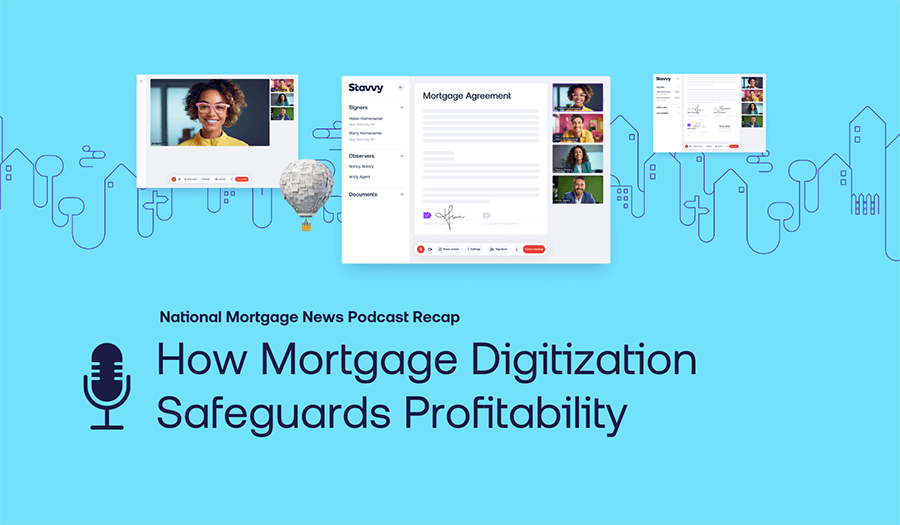Remote online notarization (RON) is one step closer to permanent use in North Carolina.
In July 2022, North Carolina Governor Cooper signed House Bill 776, The Secure Notarization Act, into law. The Act enables the Secretary of State to publicize the rules and regulations outlining how the mortgage and real estate industries can conduct remote electronic notarization in North Carolina on a permanent basis.
The bill has an effective date of July 1, 2023 to give the Secretary of State sufficient time to develop rules that flesh out the bill's details. Stavvy will monitor the legislation and update this blog as soon we learn more.
Does North Carolina allow remote notarization?
After the bill's effective date, a North Carolina notary will be permitted to notarize documents for individuals that are not in the physical presence of the notary as long as they appear before the notary using a communication technology platform approved by the North Carolina Secretary of State.
What are the communication technology platform requirements for North Caroline remote notarization?
RON transactions can only be performed by a communication technology platform that has passed specifications laid out in the bill. The communication technology must:
- Host an audio-visual meeting between the notary and all participants
- Allow real-time interaction between all participants through clear sound and video quality sufficient to allow a notary to view each participant's face and identification unobstructed
- Be able to record the interaction between all participants
- Provide the geolocation of the signer
- Create a backup of the signing session recording
- Employ data protection safeguards consistent with generally accepted information security standards
Remote electronic notary registration requirements
Before performing remote online notarization, the notary registers with the North Carolina Secretary of State. The electronic notary will also need to select the tamper-evident technology that will be used for remote electronic notarial acts with respect to electronic documents.
North Carolina remote online notarization (RON) session/meeting requirements
Prior to performing a remote electronic notarization, the notary must:
- Inform the participants that North Carolina law requires that a communication technology recording will be made of the remote electronic notarization
- Verify the identity of the remotely located principal through personal knowledge or all of the following: credential analysis with government-issued ID with picture and signature, identity proofing by a 3rd party vendor
- Ask the remotely located signer if they would like an attorney to participate in the remote online notarization and provide an attorney if requested
- Ask the remotely located signer to verbally state what documents are being signed for the notarial record or describe the nature of the transaction
- Make reasonable accommodations for remotely located signers with vision, hearing, or speech impairments
- Verify the location of the signer using geolocation via communication technology.
While performing a remote online notarization, the following must be attached to or logically associated with the electronic document. These components must be immediately perceptible and reproducible in the electronic record to which the notary’s electronic signature is attached:
- The notary’s name, state, and county of commissioning
- The words “Electronic Notary Public” or “Remote Electronic Notary Public Utilizing Communication Technology”
- The words “State of North Carolina”
- The expiration date of the commission
- The notary’s electronic signature
Video retention/Journal retention requirements
Electronic remote notaries must maintain an electronic journal with information about notarization. The notary or a third-party vendor, including a licensed platform, must retain the journal for 10 years. In addition, the electronic remote notaries must retain or engage a third-party vendor to retain recordings of remote online notarization for a minimum of 10 years.
Attorney supervision real estate closing preserved
This law does not alter or supersede the law requiring that a licensed North Carolina attorney supervise a residential real estate closing.
Emergency video notarization
Until June 30, 2023, the state's emergency video notarization remains permissible. A notary who has personal knowledge of a signer may rely on video conference technology to verify the signer's identity. If a notary does not have personal knowledge of a signer, satisfactory evidence is satisfied if the individual provides a federal, or state identification bearing a photographic impact of the signer, their signature, and physical description.
County recorder acceptance of paper documents
The ability to record an electronically notarized document will not depend on a county’s ability to perform eRecordings. The Act provides that, in cases where the county recorder does not have an electronic recording system or where the system is not operational, the county recorder will accept a paper copy of the electronic document for recordation.
Additional regulations to know about North Caroline remote online notarization
The North Carolina Secretary of State will adopt rules to establish standards, procedures, practices, forms, and records relating to remote electronic notarial acts, including:
- Any additional educational requirements for remote electronic notaries
- The contents and security of the electronic journal
- The security standards, features, qualifications, measures, storage, and any other matter related to communication technology, credential analysis, and identity proofing
- The requirements of secure storage of all communication technology records, the electronic journal, and any other documentation under the control of the remote electronic notary regarding the remote electronic notarial act
- Any necessary actions upon notification of permanent loss of data, unauthorized use, loss of use, or compromise of security of the electronic journal or the communication technology recordings of remote electronic notarial acts
How to apply as a communication technology platform in North Carolina
To become licensed, a communication technology platform must complete and submit an application along with a licensing fee of $5,000 to the Secretary of State. Before approving and issuing a platform license, the Secretary of State will conduct a background investigation on the applicant. Renewal of the platform license will occur annually and require a payment of $5,000.
Learn more about how the  is taking real estate beyond documents.
is taking real estate beyond documents.
If you're not ready to commit to RON right now, we completely understand. Instead, use this time to learn more about RON and how it can benefit your mortgage or real estate-based business.
DISCLAIMER: Because of the generality of this update, the information provided herein may not be applicable in all situations and should not be acted upon without specific legal advice based on particular situations.
Editor's note: This post has been updated to incorporate recent developments since the blog post was originally published in July 2022.



![[Webinar Recap] Advancing Your Digital Default Servicing Strategy](https://blog.stavvy.com/hubfs/advancing-your-digital-default-servicing-strategy-blog-recap.png)